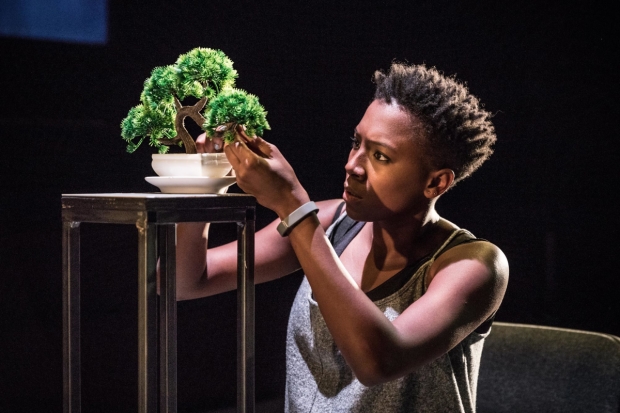Review: The Phlebotomist (Hampstead Theatre)
Ella Road’s new play looks at a dystopian world where society rates how healthy a person’s blood is

© Marc Brenner
"A phlebotomist… Is that to do with bottoms?" So asks one of the characters in Ella Road's delicately plotted new play running in Hampstead's downstairs space. You'd be forgiven for thinking so, but no, it's actually nothing to do with derrières. A phlebotomist is someone who extracts blood from patients. And it's a job that has huge significance in the dystopian world of Road's piece, where people are rated by the health, or otherwise, of their blood.
One of the main successes of The Phlebotomist is that it is set in a world very much like our own, but with slight differences. With the increasing prevalence of over-the-counter DNA testing kits, it's not too difficult to imagine living in a place where people are able to take a test to see just how likely it is that they might contract cancer, or whether they are predisposed to schizophrenia, or Parkinson's.
The play is essentially about the fallout from knowing everything about what we might or might not suffer from or die of. It begins in a hospital, where the titular phlebotomist Bea, played with beautiful nuance by Jade Anouka, has just crashed into Aaron. They strike up a sparky conversation, in which he reveals he's a 9.1 and she a 7.2: they both have good blood. But that is a little detail in their otherwise chemistry-heavy exchange, their connection to each other is immediate.
Their relationship plays out over a series of years, and we see the way society is increasingly obsessed with blood ratings. Aaron is training to be a barrister, one of the sectors that you can only get into if you have a good rating. Elsewhere there's Bea's friend Char, who is on track to become a lawyer too, but who gets Bea to secretly test her. The news catapults her down a road very different to the one she was originally on.
Road has a real subtle touch as a writer. She never undermines the audience and the information about the play's social setting is drip fed by little lines and signifiers. It's when they mention how the south coast is now a bit ‘dodgy' and fruit is an expensive luxury that we begin to understand the full context of what we see on stage. It all builds to a disturbingly plausible portrait of a place where 'rateism' is the prejudice of the day and the search for perfection is destroying people's lives.
The characters are nicely drawn and the whole cast is strong, particularly Anouka and Cherrelle Skeete as Char, who have a brilliantly warm and real friendship. Skeete's transformation – from an ambitious social player to a social justice campaigner – is both convincing and heartbreaking. The two of them give beautifully judged performances which are so enjoyable to watch. The only real character oddity was the caretaker figure of David – played with lovely poise by Vincent Ebrahim – who felt like an ethereal, unnecessary presence.
Sam Yates' direction is sharp-eyed and he deals with the many changes in scene very well, letting the set become a messy space filled with props and costume detritus. It's a reminder that this is a play – a fiction – but makes you ask: for just how long?



















